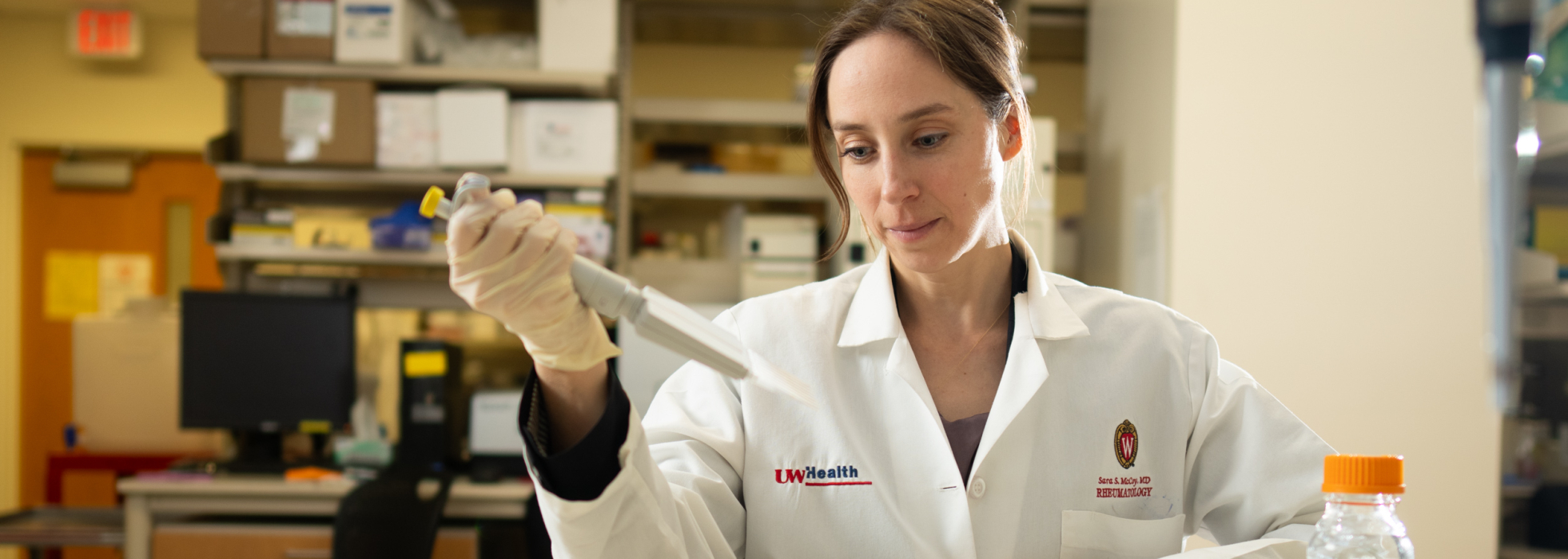Sjögren’s Disease Research
Sara McCoy, MD, PhD, is a rheumatologist who focuses on advancing understanding of Sjӧgren’s disease in order to develop new therapies.

Improving Treatments for Sjӧgren’s Disease
Dr. McCoy's research aims to define how Sjӧgren’s disease and dryness develops with the ultimate goal of improving diagnostics and treatment options for patients with the disease.
She focuses on defining minor salivary gland mesenchymal stromal cell (MSC) immunobiology. Through an understanding how MSC immunobiology differs in Sjӧgren’s disease and dryness, Dr. McCoy hopes to identify new targets for therapeutic intervention.
Dr. McCoy emphasizes a bench-to-bedside approach and she is actively working to translate her MSC work into therapeutic MSC trials. She also is working toward identifying novel diagnostic antibodies in Sjӧgren’s disease.
Research Team
Scientist
Students and Collaborators
Undergraduate students
- Angela Cui
- Addy Vande Loo
Additional collaborator
- Franklin Zhou

If you are interested in joining our team, please send your CV and a brief description of your research experience and interests to Dr. McCoy.
Active Projects
- Immunobiology of salivary gland mesenchymal stromal cells
Sjӧgren’s disease (SjD) is the second most common systemic rheumatologic disease, characterized by a marked female predominance and with hallmark features of oral and ocular sicca. SjD-related oral sicca is thought to be related to characteristic inflammatory infiltration of salivary glands. Mesenchymal stromal cells (MSCs) are contained within the stromal component of salivary glands and contribute homeostatic properties such as regeneration, repair and local immunomodulation.
Despite the therapeutic potential of MSCs, little is known about SjD salivary gland MSCs (SG-MSCs). Our goal is to define the role salivary gland MSCs play in SG health and disease, focusing on their immunomodulatory properties.
- Identifying novel Sjogren’s autoantibodies
Autoantibodies play important roles in the pathogenesis and diagnosis of Sjӧgren’s disease (SjD). Our goal is to identify new autoantibodies to improve the diagnosis of our SjD patients by reducing delays in diagnosis and the need for invasive biopsies for diagnosis.
- Defining the epidemiology and phenotype of SjD to drive deeper understanding of mechanisms driving the disease
No FDA-approved therapies exist for Sjӧgren’s disease (SjD). One theory behind why multiple clinical trials in SjD have failed is that SjD is a remarkably heterogeneous disease.
To address this phenotype heterogeneity, we used hierarchical clustering by dryness, pain and fatigue to identify four symptom-based clusters in a multi-institutional collaboration. These four clusters displayed differing symptom burden, medication use, and disease activity.
Interestingly, the cluster with the highest symptom and lowest quality of life had a lower disease activity profile. Despite lower objective disease activity, this cluster received more immunomodulatory therapy.
Our findings, recently published in A&R, emphasized a discordance between objective measures and treatments. We proposed a new paradigm of symptom-based clustering approach that can be leveraged for both clinical trial and clinical patient stratification. We also described symptoms and quality of life from the largest US-based SjD cohort. Importantly, we found that symptoms such as dryness and fatigue are most important to patients for therapeutic development.
- Pharmaceutical-sponsored clinical trials
We offer cutting-edge clinical trial therapy to advances patient health and our understanding of the disease process.
- Investigator-initiated clinical trials
We received U.S. Food and Drug Administration investigational new drug approval to give bone marrow mesenchymal stromal cells (MSCs) into the salivary gland to treat dry mouth from many causes. Our hope is that we can improve life-impacting severe symptoms using our patients' own cells as therapy.
Funding Support
Dr. McCoy's research is funded by the UW Head and Neck Cancer Specialized Program of Research Excellence (SPORE), the UW Center for Cooperatives, the Oklahoma Medical Research Foundation and the Accelerating Medicines Partnership® : Autoimmune and Immune Mediated Diseases (AMP® Aim) Leadership Scholars Program.


